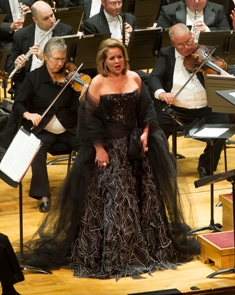
Fleming Down to Earth Diva
The house was nearly full for soprano Renée Fleming’s Cincinnati debut Tuesday evening at Music Hall.

The crowd on hand for her performance, a gala ringing up the curtain on the Cincinnati Symphony Orchestra’s 2012-13 season, not only heard her. They met her.
Fleming captivated her listeners with her peerless singing, and perhaps unexpectedly -- given her elevated status as one of the world’s reigning divas -- her personality. Sprinkling her arias and songs with commentary, some of it delightfully humorous, she conveyed a down to earth, almost girl-next-door image.
“I’m so excited I can still have a debut,” she said. “This is my new favorite venue.”
She inhabited her roles onstage just as easily as her own, whether it be the grief-stricken Desdemona in Verdi’s “Otello” or the sunny Maria from “The Sound of Music” (Rodgers and Hammerstein).
The black-tie event, dubbed “Bella Notte,” complete with pre-concert dinner and post-concert reception in the Music Hall Ballroom, gave a great big nudge to the CSO season (which opens officially Friday night with violinist Joshua Bell). The orchestra was led by guest conductor Sebastian Lang-Lessing, music director of the San Antonio Symphony, in his own notable (CSO) debut.
The concert got off to a Gallic start, with songs by Léo Delibes and Henri Duparc and Marguerite’s “Jewel Song” from Gounod’s “Faust.” Delibes’ “Les filles de Cadix” (“The Girls of Cadiz”) was frothy and flirtatious, Duparc’s “Phidylé” (sung to a sleeping beloved) soft and sweet, by comparison. Fleming prefaced Marguerite’s aria with “I never thought much about jewelry” (which sparkled on her hands, of course), then put plenty of refined bling into her rendition of Marguerite’s delight in the lure left her by Mephistopheles in the opera.
High point of the first half – and indeed of the entire concert – was the “Willow Song and Ave Maria” from “Otello.” Fleming stepped into another world here and took her listeners with her as she sang Desdemona’s poignant farewell to life in the final scene of Verdi’s tragedy. “Salce, salce” (“willow, willow”), she sang, her lament broken by a heart-rending “Addio” and the final searching “Ave Maria.” Her vocalism was such that the softest notes projected clearly into the huge hall, aided by her compelling stage presence.
Another favorite was “Song to the Moon” from Dvorak’s opera “Rusalka.” about an ill-fated water sprite in love with a prince, which Fleming delivered with affecting beauty.
Between sets by Fleming, Lang-Lessing led the CSO in spirited performances of the Overtures to Verdi’s “I vespri siciliani” (“The Sicilian Vespers”) and “Captain Blood,” the 1935 film score by Erich Wolfgang Korngold. The latter was an inspired touch, coming just before Fleming’s “Frag mich Oft” (“I Often Wonder”), a song Korngold wrote for his 1930 operetta “Walzer aus Wien” (“Waltzes from Vienna”), before immigrating to the United States and embarking on his highly successful Hollywood career.
The second half of the concert was more Italianate, opening with Lang-Lessing and the CSO in the Intermezzo from Act III of Puccini’s “Manon Lescaut” (illumined with solos by CSO principals Ilya Finkelshteyn, cello, and Christian Colbert, viola). Fleming, who had changed from black and sparkling to a bright fuchsia gown, followed with “Ombra di nube” (“Shadow of a Cloud,” 1935), a sweet, meditative lyric by priest/composer Licinio Refice.
Next came two arias from “La Boheme” -- not by Puccini, but Ruggero Leoncavallo (composer of “Pagliacci”). The first, sung by the heroine Mimi, speaks admiringly of the vivacious Musetta. The other, sung by Musetta, compliments the loveable Mimi. Fleming’s demonstrative, perky rendition made a persuasive case for the neglected work. Puccini’s “Vissi d’arte” (“I lived for art” from “Tosca”), which needed no introduction, was moving in the extreme.
After a rousing performance of Rodgers and Hammerstein’s “Carousel Waltz” (“Carousel”) by Lang-Lessing and the CSO, Fleming moved to Broadway and favorite songs from “The Sound of Music” (“The Hills are Alive”) and “The King and I” (“Hello, Young Lovers”). She closed with “I Could Have Danced All Night” from “My Fair Lady” (Lerner and Loewe). For the second verse, she scored another coup with the audience by inviting them to sing along, drawing an enthusiastic response and a standing ovation.
Encores there were, and the crowd ate them up: “I Feel Pretty” from “West Side Story” – another sing along – “Danny Boy,” in a colorful arrangement featuring twittering woodwinds, and an aria that had obviously been saved for last, the perennial favorite, “O mio babbino caro” (“O My Dear Papa”) from “Gianni Schicchi.” (Puccini).
Honorees at the gala events before and after the concert in the Music Hall Ballroom, were Vicky and Rick Reynolds, long time supporters of the CSO.